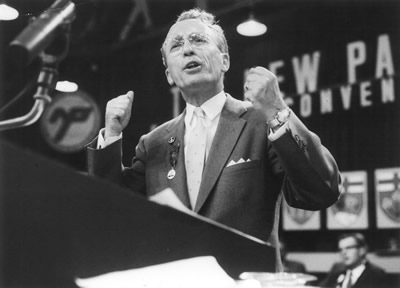In 2011, the Canadian Press reported that the RCMP security service spied on CCF-NDP icon Tommy Douglas from the 1930s until shortly before he died in 1986. But the file on Douglas represented just a tip of the proverbial iceberg, as the McDonald Commission into RCMP misbehaviour revealed that in the 1970s, the security service maintained files on 800,000 individuals. Those files represented information on one of every 27 Canadians, Professor Reg Whitaker and his co-researchers estimate in the 2012 book, Secret Service.
This spying was driven by the state’s fear of and obsession with communism, which was the lens through which the RCMP perceived any progressive activity. No doubt that there were many who believed that if one had done nothing wrong, there was nothing to fear — a position that is either naïve or disingenuous. After all, the RCMP spied on communists, trade unionists, students, professors, civil servants, women’s groups, separatists, anti-apartheid and aboriginal activists. We don’t know, for example, how many careers may have been affected by information shared by police and security officials with government departments or university presidents.
Being described as a “communist” then was akin to being called a “terrorist” today. And there are consequences. Mahar Arar, a Syrian-born Canadian citizen, was detained and questioned by American officials at a New York airport in 2002 before being flown by private jet to Syria to be interrogated and tortured. Fortunately for Arar, there was a loud outcry — led by his courageous wife Monia Mazigh — for his release. It became clear in the ensuing public inquiry, headed by Justice Dennis O’Connor, that Arar was innocent of the claims made against him; that he and acquaintances had been spied upon by the RCMP; and that the police had shared erroneous information about Arar with their American counterparts.
In the wake of information made available by Edward Snowden, a whistleblower who once worked for the National Security Agency in the U.S., we are discovering the extent of spying activity by the Canadian government, including that of Communications Security Establishment Canada. In fact, the country helped Americans to spy upon world leaders attending the 2010 G20 meetings in Toronto and the Ministry of Mining and Energy in Brazil, likely sharing this information with Canadian mining interests. As well, our security agencies are reportedly watching the movements of Canadian environmental and aboriginal activistsconcerned about pipeline and energy developments. The government has developed increasingly close relationships with the carbon industry in order to share information on what they perceive to be terrorist threats.
Today, practices and technology involved in spying are exponentially more sophisticated than they were when flat-footed plainclothes police trailed Tommy Douglas, eavesdropping on his conversations. It is now technically possible for security agencies to trap all of our email and telephone conversations. Yet our mechanisms for oversight by Parliament remain woefully inadequate. Indeed, these are perilous times for our treasured democratic rights to privacy and dissent.
This piece appeared, under a slightly different title, on the United Church Observer blog of January 9, 2014.



